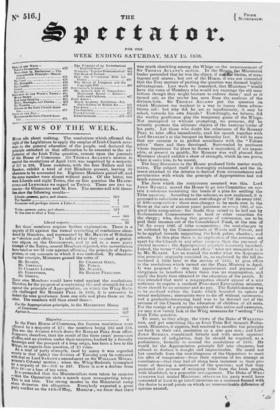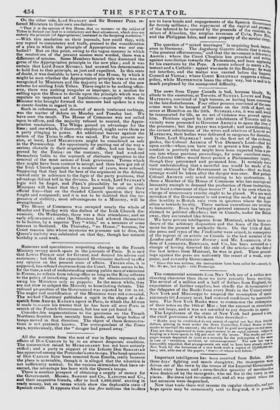NEWS OF THE WEEK.
Liberal majority 22
But these numbers require further explanation. There is a majority of 22 against the formal rescinding of resolutions aban- doned by Ministers, and represented by Mr. Bersierr of Wiltshire as "obsolete and effete." To inflict what they deemed a gratui- tous stigma on the Government, and to aid in a mere party triumph of the Tories, several Members objected, who nevertheless
hate voted or would vote against affirming the principle of Appro- priation, or any tonsure in which it was embodied. By abandon- ing that principle, Ministers gained the votes of
Mr. BENETT, Sir CHARLES GREY, Mr. TOWNLEY, Mr. PUSEY, Sir CHARLES LEMON, Mr. SLANEY, Mr. FLEETWOOD, Sir ROBERT FERGUSON. Mr. GORING,
These nine Members would have voted against the resolutions. Therefore, for the purpose of ascertaining the real strength for awl
against the principle of Appropriation, on which the Whig•Ilaili- cal' challenged Sir ROBERT PEEL in 1835, it is necessary to deduct the nine gentlemen from one side and place them on the other. The numbers will then stand thus— For the Appropriation principle, in the MELBOURNE House of Commons 8:31
Against it, 327 Majority 4
In the PEEL House of Commons, the famous resolutions were affirmed by a majority of 27; the numbers being 285 and 258. Thu was the division which drove Sir ROBERT PEEL from office. It appears, therefore, that the result of the three years' possession tif office, and an election under their auspices, backed by a friendly Sovereign and the prospect of a long reign, has been a loss to the Whigs, as regards this question, of 23 votes.
As a trial of party strength, (and by many it was regarded i merely in that light,) the division of Tuesday may be compared
with that on Lord SANDON'S amendment on Sir WILLIAM MOLES- RI:4meg Colonial motion ; when the Whig-Radicals triumphed by a majority of 29-316 to 287. There is now a decline from 29 to 19—ora loss of ten votes.
i It s pretended that the Ministerialists were taken by surprise
:.-that the Opposition stole a march upon unsuspecting troops. This is not true. The strong muster in the Ministerial camp a one disproves the allegation. Everybody expected a great Patty conflict on the 19th of May, Moreove., we know that there Liberals—peisset, pairs, and absent 338
The Speaker 1
Gloucester will perhaps return a Liberal
Tories—present, pairs, and absent 317
St. Ives sure to elect a Tory
040
318 was much chuckling among the Whigs on the announcement of
Sir THOMAS ACLAND'S motion. In the Hoyle, Ministerial leader pretended that lie was the object, if noMe-victim, of stra- tagems and snares ; but out of the House, it was not concealed that the Tory manner of putting the question was deemed highly advantageous. Last week we remarked, that Ministers " would have the votes of Members who would not expunge the old reso- lutions though they might hesitate to enforce them;' and so it turned out, as the realer has seen from the analysis of the division-lists. Sir THOMAS ACLAND put the question on which Ministers are weakest in a way to insure them adven- titious aid : but why did he act so injudiciously, it may be asked, towards his own friends? Unwittingly, we believe, did the worthy gentleman play the temporary game of the Whigs. Not uninspired or without prompting, we presume, did he actually promote the ultimate objects of the cautious leader of his party. Let those who doubt the reluctance of Sir ROBERT PEEL to take office immediately, read his speech together with Lord STANLEY'S at the banquet on Saturday last. It will be seen that our surmise is in perfect accordance with the " Fabian policy" there and then developed. Surrounded by partisans whose impatience for place he deems it imprudent, if not impos- sible, at present to gratify, Sir ROBERT was well pleased that Ministers should exhibit a show of strength, which he can prove. when it suits him, to be unreal.
The long discussion in the House produced little matter worth notice. The subject itself is thoroughly exhausted, and the in- terest attached to the debates is derived from circumstances and peculiarities with which the principle of Appropriation had not much connexion.
The form which the controversy assumed was this. Lord JOHN RUSSELL moved the House to go into Committee on cer- tain resolutions containing the heads of a plan for settling the Tithe question. According to the scheme, as now explained, it is proposed to substitute an annual rent-charge of 701. for every 1001. of tithe-composition: these rent-charges to be made over to the State at the rate of sixteen years' purchase on every 1001. of ori- ginal tithe composition: the funds thus raised to be laid out by Ecclesiastical Commissioners in land or other securities for the clergy ; who, during this process of conversion, are to be paid their incomes out of the Consolidated Fund, at the rate of 70/. for every 1001. of tithe composition : the rent-charges to be collected by the Commissioners of Woods and Forests, and to be applied towards supporting the Irish police, charities, and schools. In this plan there is no applicati.in of the revenues set apart for the Church to any other purpose than the payment of clerical incomes : the Appropriation orilicip!e is entirely banished. Indeed, the terms "obsolete and eflete " were not misapplied to it by Mr. BENET?. Let us remind the reader what the Appropria- tion principle originally consisted in, as explained by the bill in- troduced a little later in the session of 1833, to give effect to the resolutions which turned out the PEEL Ministry in April. It was proposed to stop the appointment and payment of clergymen in benefices where there was no congregation, and apply the funds thus obtained to the education of the people. It was intended that until a congregation should appear of a size sufficient to require a resident Protestant Episcopalian minister, there should be no minister and no pay. The Establishment was to be confined within the limits which bounded its sphere of actual usefulness; sinecurists were to die off without successors; and a gradually-increasing fund was to be devoted out of the revenue of the Church to the education of children of all sects. For the vestige of a principle capable of this action and extension, we may now vainly look in the Whig measures for " settling " the Irish Tithe question. To meet, as they allege, the views of the Duke of WELLING• TON, and get something like an Irish Tithe Bill through Parlia- ment, Ministers, it appears, had resolved to sacrifice the principle set forth in their own resolution as a sine qua non ; and Lord JOHN RUSSELL complained bitterly and with much apparent earnestness of indignation, that he should be required, as a
preliminary, formally to rescind the resolutions of 1835. He
would let the Appropriation principle fall into abeyance, but refused to declare it naught and impracticable. He could not
but conclude from the unwillingness of the Opposition to meet his offer of compromise—from their rejection of his attempt at conciliation—that they had all along been insincere in their prei. tence of desiring a settlement of the question ; and that they
preferred the process of wringing tithe from the Irish people, with bloodshed, to a peaceable arrangement. The Duke of WEL- LINGTON had misled Ministers; otherwise his party would have consented at least to go into Committee on a measure framed with the desire to avoid points on which an irreconcileable difference of" opinion existed,
On the other side, Lord STANLEY and Sir ROBERT PEEL re- ferred Ministers to their own resolution-
" That it is the opinion of this House, that no measure on the subject of Tithes in Ireland can lead to a satisfactory and final adjustment, which does not embody the principle (of Appropriation] contained in the foregoing resolution."
—With this resolution on their journals, how could they, with any regard to consistency and truth, proceed to the consideration of a plan in which the principle of Appropriation was not em- bodied ? But on this point, owing to the vague manner in which the resolutions of the present session were worded, there was a difference of opinion. Some Members fancied they discerned the germ of the Appropriation principle in the new plan ; and it was certain that Lord JOHN RUSSELL had avowed his determination to hold fast to that principle, as just and expedient. In this state of doubt, it was desirable to have a vote of the House, by which it might be seen whether the Appropriation principle was or was not recognized by Ministers and the majority as the basis of the new scheme for settling Irish Tithes. There ought to be nothing offen- sive, there was nothing irregular or improper, in a motion for calling upon the House to decide upon the principle which was to regulate an important act of legislation,—especially when the Minister who brought forward the measure had spoken in a way to create doubts in regard to it. Such in substance, and divested of much irrelevant verbiage, was the matter of debate on Monday and Tuesday last. We have seen the result. The House of Commons was not called upon to affirm, and the majority refused to rescind, the Appro- priation resolutions. The Whigs gained an advantage for the time; and one which, if discreetly employed, might serve them as a party clinging to power. An additional barrier against the return of the Tories to office was raised. For the present ses- sion, at least, Lord MELBOURNE might be considered as safe in the Premiership. An opportunity for putting out of the way a serious obstacle to their acquisition of office, had not been im- proved by the Tories: on the contrary, they had rendered themselves liable to the reproach of obstinate opposition to the removal of the most serious of Irish grievances. Terms which they might have been content to accept, and thus have got rid of the Irish Church question for a number of years, were refused. Supposing that they had the best of the argument in the debate, viewed only in reference to the logic of the party positions, that advantage did not tell in the division. In a week, Lord STANLEY'S logic will he forgot, and PEEL'S plausibility be of no avail. Ministers will boast that they have passed the crisis of their official fate—that on the dreaded Church question they have fought and conquered; and it is not to be doubted that the im- pression of stability, most advantageous to a Ministry, will be strengthened.
The House of Commons was occupied nearly the whole of Monday and Tuesday with this dullest of the Irish Church dis- cussions. On Wednesday, there was a thin attendance, and an
early adjournment ; after the Ministers had allowed themselves to be beaten, by a superior Tory " whip," on a measure of some interest in Scotland. On Thursday, " no House ;" because, for Court reasons into whose mysteries we presume not to dive, the Queen's nativity was celebrated un that day, though her natural birthday is next week.



























